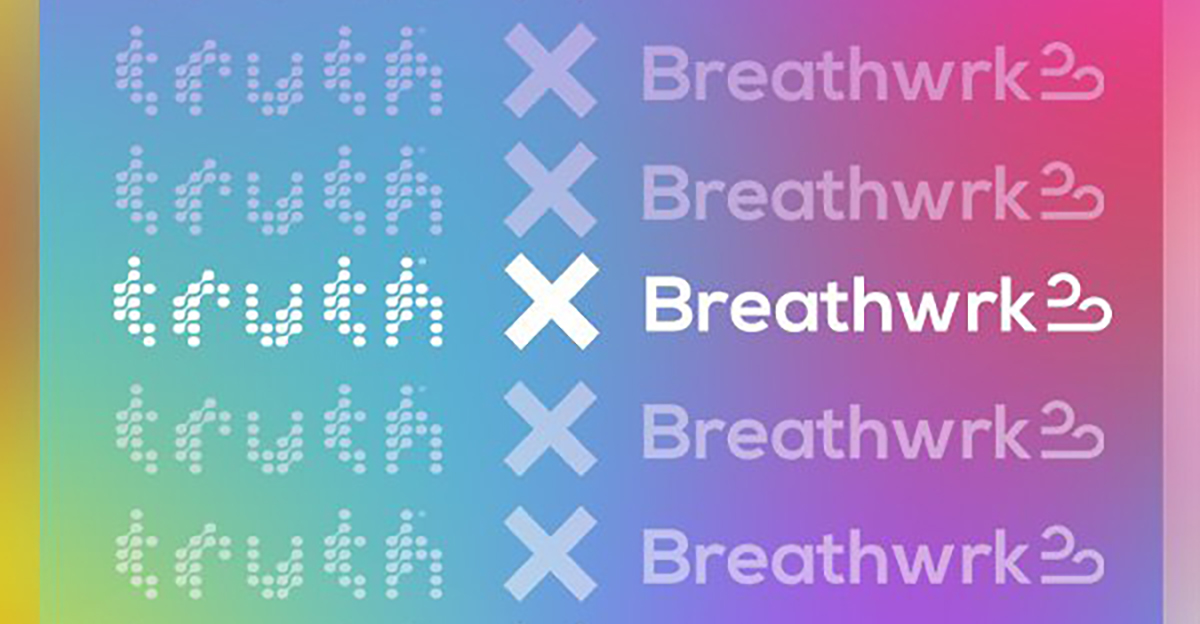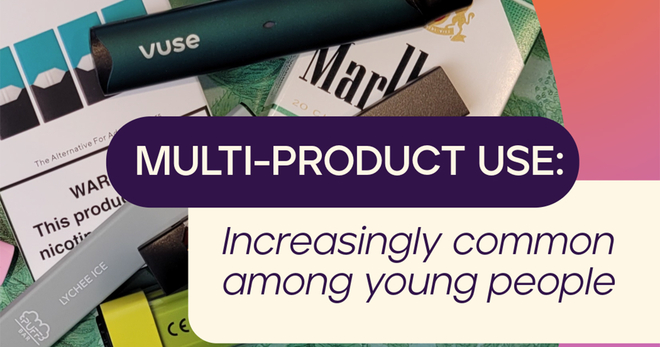Nicotine use and stress
Using nicotine can be complicated. In the short-term, vaping nicotine may feel good by stimulating production of the “feel good” chemical in the brain called dopamine which can create feelings of pleasure and relaxation. Vaping nicotine also creates social opportunities to connect with other people and provides a distraction from stressful situations. These are powerful drivers for continuing to vape.
However, because of the way nicotine works in the body, those feel-good chemicals don’t last long. Within just a few hours, the effect of nicotine in the body wears off and can lead to a desire to vape again. This is nicotine withdrawal, and it includes cravings or urges to vape, feeling irritated or upset, feeling jumpy and restless and having a hard time concentrating, changes in sleep and eating habits, and feeling anxious or depressed. Over time, it can take more and more nicotine used more and more frequently to create that same good feeling and deal with these symptoms of withdrawal. That’s called nicotine dependence. Eventually, what started out as a pleasurable experience of vaping nicotine turns into vaping to get rid of withdrawal symptoms.
This cycle can make it feel like vaping nicotine relieves anxiety and depression. But the reality is that it only addresses withdrawal symptoms and makes the cycle continue.
Because of this complex cycle, many tobacco users falsely believe tobacco products can relieve stress or anxiety. The idea that tobacco products curb the symptoms of nicotine withdrawal is often misinterpreted as a beneficial effect on mental health, according to research on the effects of quitting smoking on mental health.
Nicotine — which is found in e-cigarettes, cigarettes, and other tobacco products — harms developing brains, and can make young people more susceptible to addiction, and has implications for mental health. These connections were highlighted in the Truth Initiative® report “Colliding Crises: Youth Mental Health and Nicotine Use.” We explore one of those connections — nicotine and stress — in more detail here and dispel some of the myths about nicotine as a stress-reliever.

Vaping nicotine can increase anxiety symptoms and stress levels. However, many tobacco users falsely believe tobacco products can relieve stress or anxiety.
WHAT HAPPENS IN THE BRAIN OF A NICOTINE USER?
When a smoker puffs on a cigarette, nicotine is carried into the lungs via smoke particles where it is absorbed into blood and makes its way quickly to the brain. Once in the brain, nicotine increases the release of dopamine, a chemical that signals pleasure, which keeps them addicted to nicotine.
WHY DO SO MANY TOBACCO USERS THINK THAT NICOTINE ALLEVIATES STRESS?
Nicotine’s release of pleasure-inducing chemicals makes tobacco users feel good in the short-term and can appear to have a positive effect on stress. However, it’s important to note that nicotine use does not alleviate stress in the long-term and instead can trap users in a cycle of nicotine addiction. Smokers experience irritability, anxiety, and depression when they have not smoked for a while, feelings which are relieved by smoking. The cycle of symptoms followed by relief from smoking can create the perception that smoking has psychological benefits.
SELLING THE MYTH OF STRESS RELIEF
The tobacco industry has promoted the illusion of nicotine as a stress-relieving tool for decades. It has invested significant resources in marketing that connects tobacco use with mental well-being, stress relief, relaxation, and pleasure.
One prominent theme used in tobacco advertising is that “smoking can help solve some personal and emotional problems by relieving stress and promoting relaxation.”
Many e-cigarette brands are now tapping into themes of stress relief and mental wellbeing as well. For example, the popular disposable e-cigarette brand Puff Bar marketed its product during the pandemic as a way to “stay sane,” advertising it as “the perfect escape from back-to-back zoom calls, parental texts, and WFH stress.”
In addition to supporting research that positions cigarettes as a way to self-medicate and using stress relief themes in marketing, the tobacco industry has even gone so far as to give away cigarettes to psychiatric facilities. Roughly a third of all cigarettes consumed in the U.S. are smoked by adults with some form of mental illness compared to adults with no mental illnesses.
HOW DOES NICOTINE AFFECT STRESS LEVELS?
Nicotine use – whether through smoking or vaping — can increase stress levels. Despite the tobacco industry’s promotion of its products as stress-relieving, studies among cigarette smokers have found that young people who smoke have higher levels of perceived stress.
- Adolescent cigarette smokers were significantly more likely to report greater stress levels than those who quit smoking, according to an article published in JAMA Pediatrics.
ARE YOUNG PEOPLE VAPING NICOTINE TO LESSEN STRESS?
Despite studies illustrating nicotine’s role in exacerbating stress levels and showing that tobacco users tend to have higher levels of stress, young people continue to mistakenly turn to tobacco as a source to relieve stress. Research by Truth Initiative shows that, during the pandemic, a large majority of young e-cigarette users started using them to lessen feelings of stress, anxiety, or depression, and many continue vaping to cope with these feelings.
- 81% who had used e-cigarettes said they started vaping to decrease stress, anxiety, or depression, according to an August 2021 survey of 1,000 people between ages 15 and 24.
- More than half of vapers use e-cigarettes to cope: 50.3% of frequent vapers — those who vaped 20 or more days in the past month — reported that they need to vape to cope with stress or anxiety, according to Truth Initiative continuous tracking data from June 2021.
- In a separate study, when respondents were asked about the advantages of e-cigarette use, one of the most frequently listed advantages was “relaxation and stress relief.”
- More than twice as many frequent vapers (45%) agreed that it is OK to vape for stress relief compared to non-vapers (20%). Similar patterns exist for survey respondents with any past 30-day use of e-cigarettes.

“I used nicotine as a stress reliever because I lost sight of working out and my health. Think long term, think about your body and your mind.” – MAYA, 18-24
DOES QUITTING NICOTINE LOWER STRESS LEVELS?
Quitting smoking has powerful benefits for mental health. According to a 2014 review of 26 studies, quitting smoking is linked with lower levels of stress, anxiety, and depression, as well as improved positive mood and quality of life compared with those who continue to smoke. And Truth Initiative surveys of young people who quit vaping nicotine-containing e-cigarettes found that 90% of those who quit vaping said they felt less stressed, anxious, or depressed.
SUPPORT FOR THOSE EXPERIENCING MENTAL HEALTH CONCERNS
Many resources exist for those concerned about their mental health, including immediate help for people experiencing crises:
- National Council for Mental Wellbeing seeks equitable access to mental health and substance abuse treatment for more than 10 million children, adults, and families and works to increase health providers’ abilities to diminish tobacco- and cancer-related disparities in individuals with mental health and substance use challenges.
- Crisis Text Line offers 24/7 support from trained crisis counselors from a secure online platform. Text “HOME” to 741741 from anywhere in the U.S. to connect with a volunteer crisis counselor
- The Suicide Prevention Lifeline connects callers to trained crisis counselors 24/7. They also provide a chat function on their website. Phone: 1-800-273-TALK (8255).
- Mental Health America offers an online mental health screening. The tests can help determine whether people are experiencing symptoms of a mental health condition.

The power of breath to address nicotine use and stress
Nicotine withdrawal causes stress and anxiety. Breathing exercises can help — breathing is a proven method to reduce anxiety and can help curve cravings. Breathwrk and This is Quitting from truth have partnered to create quitting-specific breathing exercises to help young people cut nicotine cravings and reach their quitting goals.
The #1 Breathwrk app offers science-backed breathing and meditation exercises to help reduce stress, fall asleep faster, and stay energized throughout the day. This partnership with Breathwrk offers three custom breathing exercises designed to help young people relieve anxiety, strengthen lungs, and ease cravings while trying to quit vaping, including:
- No Worries: Designed to be your stress relief breath.
- Strong Lungs: Designed to strengthen breathing muscles and increase lung capacity.
- Craving Curber: Designed to shift your state and attention when experiencing unwanted cravings.
Users can download the Breathwrk app for free and subscribe to the truth routine for regular reminders and new exercises. As part of the partnership, Breathwrk is also proud to offer the truth community and This is Quitting users a free 6-month subscription to its premium product, Breathwrk Pro, where young people can access all available breaths. For more information, see thetruth. com/mentalhealth2022.
ACTION NEEDED
Policy makers and regulators must take steps to reduce the use of e-cigarettes, including removing all flavored tobacco products, restricting nicotine levels, ensuring a thorough and transparent pre-market review process, restricting e-cigarette marketing to adults only, restricting access to adult smokers, prohibiting internet sales of all tobacco products, and setting taxes on e-cigarettes at a level high enough to discourage youth use. See “Action Needed on E-cigarettes” for more detail about how Truth Initiative advocates to protect young people from nicotine addiction.

“Remember that stress can be dealt with in other ways! Try meditating or even writing down what the problem is and then figure out solutions.” – DALTON, 18-24
TAKE A BREATH AND TAKE ACTION
Around the country, young people are taking action by using self-care as a form of activism and calling upon decision makers to declare vaping nicotine a mental health issue. Through our partnership with Breathwrk, each breath taken is a show to the FDA, White House, and all decision makers, that young people are fighting to protect their mental health. Anyone can join the movement by visiting: thetruth.com/mentalhealth2022
More in emerging tobacco products
Want support quitting? Join EX Program
By clicking JOIN, you agree to the Terms, Text Message Terms and Privacy Policy.
Msg&Data rates may apply; msgs are automated.



